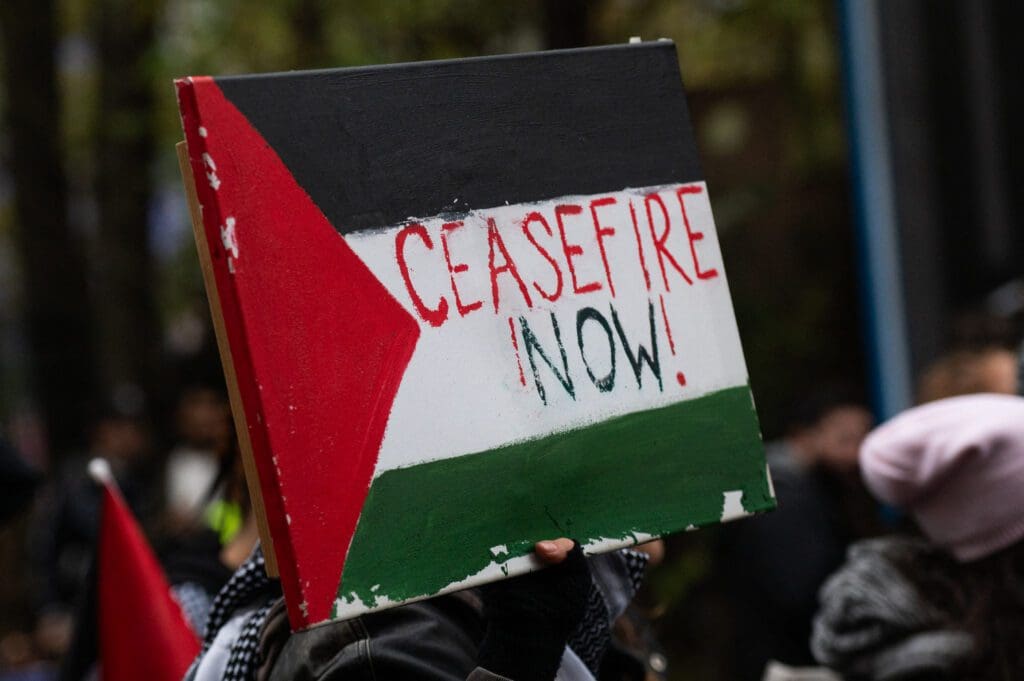The shocking and unprecedented attack by Hamas on southern Israel caught the technologically advanced Israeli army and security forces by surprise. Hamas’s initial assault killed more than 1,400 Israelis, and thousands of Palestinians have been killed as Israel has retaliated in Gaza. Israel has said hundreds of hostages are being held in Gaza. In addition to the fighting, Gaza’s besieged population is facing growing starvation as Israel has closed the border to virtually all supplies aside from a few humanitarian shipments. The Gazan population has been forced to evacuate toward the south of the strip under the threat of a ground invasion by the Israeli army.
These are dire circumstances. A cease-fire is the only bridge toward durable peace between Israelis and Palestinians and in the region as whole. All must make clear an Israeli life and a Palestinian life are worth the same.
The new cycle of violence between Israel and Palestine is sowing radicalization that will affect people on both sides for generations to come. The violence risks rapidly engulfing the whole region, including Iran, Egypt, Lebanon, Syria, and beyond.
Beside the human toll, the military escalation in the Middle East bears bad news for the world economy. It adds to the energy and food crises stemming from the invasion of Ukraine. Rising energy prices will become a domestic political challenge for incumbent leaders around the world including in the U.S. and Europe but also China and India. Civil unrest is spreading globally, with protests rising in the U.S., Europe, and Middle East. As that pressure builds, so do the political costs. Indeed, the conflict will further support high energy prices and disrupt energy trade at a time when inflation remains rampant worldwide.
Western countries that have been staunch allies of Israel have to play their parts to de-escalate the situation. Indeed, Western allies have rightly condemned the brutal murder of hundreds of Israeli civilians. But they have said much less about the thousands of Palestinian civilians killed in Israel’s response, despite warnings from their Arab partners that the fighting could spread.
The secretary general of the United Nations has called for an immediate cease-fire and the opening of humanitarian corridors to help civilians in need. The U.N. General Assembly passed a nonbinding resolution calling for a “humanitarian truce,” after several resolutions failed in the authoritative Security Council. The failures included one resolution sponsored by Brazil calling for de-escalation and access to humanitarian aid that was vetoed by the U.S. Some aid has been allowed into Gaza, but no cease-fire is in sight.
The White House has declined to call for a cease-fire, saying it is instead asking for a humanitarian pause to allow aid in and hostages out. A pause “is not going to stop Israel from defending itself,” a White House spokesman said Thursday. On Friday, U.S. Secretary of State Antony Blinken met with the Israeli president. Blinken told reporters, “We provided Israel advice that only the best of friends can offer on how to minimize civilian deaths while still achieving its objectives of finding and finishing Hamas terrorists and their infrastructure of violence.”
Israeli Prime Minister Benjamin Netanyahu immediately rejected the limited ask for a humanitarian pause, saying Israel “refuses a temporary cease-fire that doesn’t include a return of our hostages.” Netanyahu has said the conflict is between “civilization and barbarism,” a perspective that makes further escalation all but assured. Egypt and Jordan have flatly rejected the possibility of taking in more Palestinians, on the grounds that such a displacement is likely to be permanent, and only a negotiated settlement of the Palestinian issue can lead to a durable peace in the region. The Arab streets are brewing with calls to stop the strikes on Gaza and end the bloodshed.
The Palestinian issue remains a major rift in the growing opposition between global north and global south. Many in the global south have denounced what they see as double standards between the West’s support of Israel as it bombards Palestine and the swift condemnation of Russia’s attack on Ukraine. Many Americans share that view.
The world community is fragmenting perilously. Western countries have long argued that a rules-based order must be preserved. The West has often presented itself as the guardian of human rights and international agreements, including the Geneva Conventions, which set rules including in times of war. Arab populations, and many others in the world, see what’s happening now as the shredding of that rules-based order.
Granted, nonstate actors are increasingly challenging states in ways that lead the latter to violate the rules they have themselves promulgated and committed to follow. That is a slippery slope, however. When states abandon their rules, civilians end up paying the price, and populations become only more alienated. The inconsistent application of rules undermines any future collective efforts to try and find peace around the world.
Amid what seems like an impossible situation, a cease-fire remains the only bridge toward peace. The alternative would yield to the worst outcome for all parties. It is high time for a negotiated settlement of the Israeli-Palestine issue, to end the bloodshed, and stop the escalation of violence. The U.S. remains a pivotal actor in the region also given its military presence, even as its economic presence is winding down to the benefit of China. The two super powers around which the global north and global south gravitate have not only a stake in peace but also a responsibility to find a pathway toward it. To get there, a cease-fire must be imposed in Gaza.


